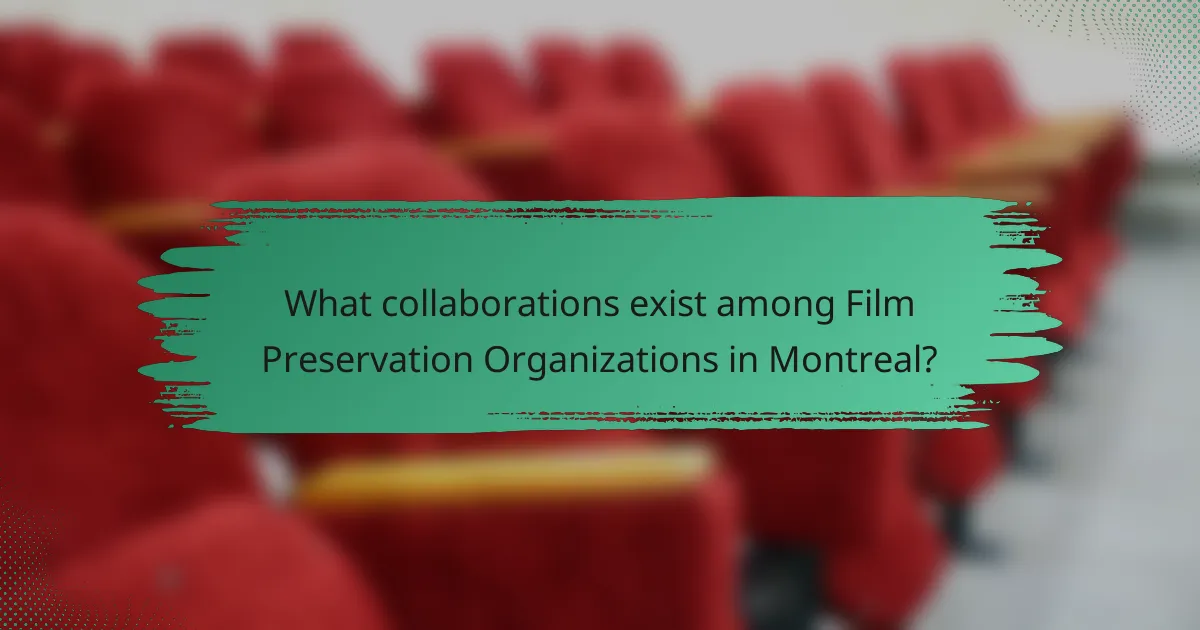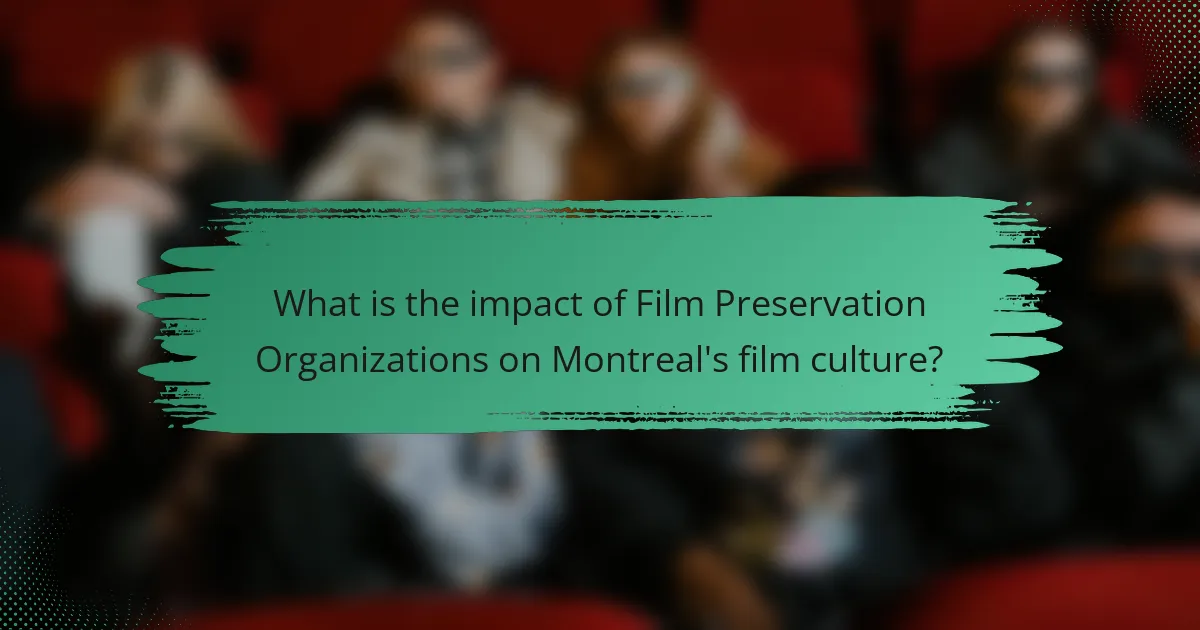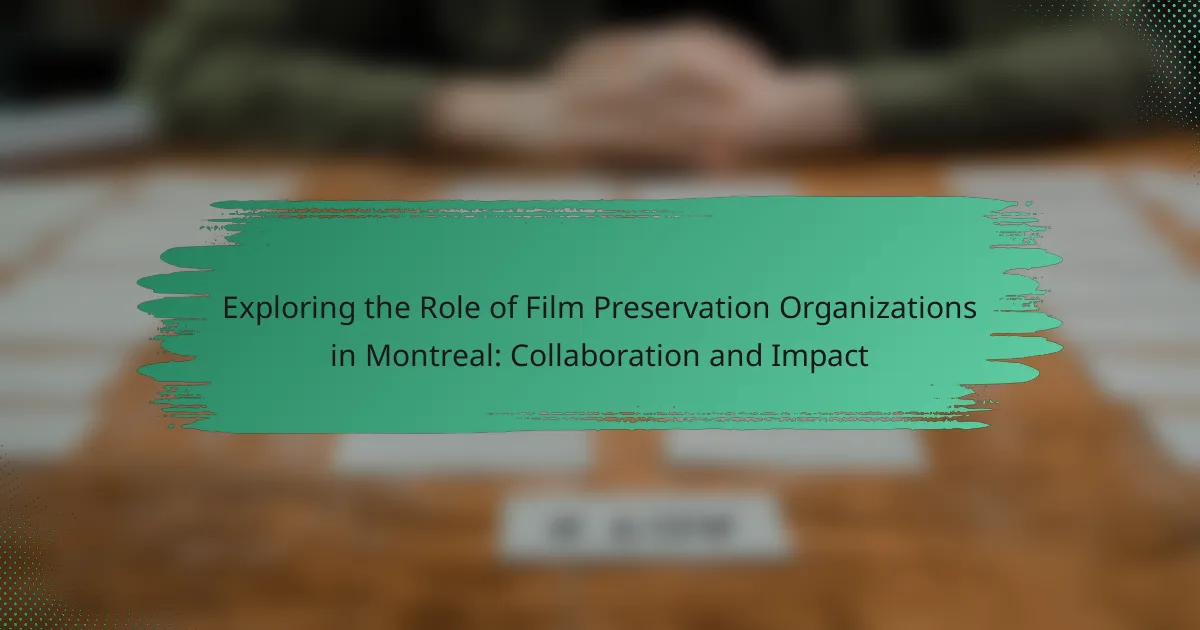Film preservation organizations in Montreal are dedicated entities focused on the conservation and restoration of cinematic works, ensuring the protection of cultural heritage. Key organizations such as the Cinémathèque Québécoise and the National Film Board of Canada engage in activities like digitizing old films, restoring damaged footage, and providing access to historical collections. These organizations collaborate with filmmakers, archives, and educational institutions to enhance film education and public screenings. Their joint initiatives, including the Montreal International Documentary Festival, promote awareness of film heritage and foster community engagement, ultimately enriching Montreal’s vibrant film culture and inspiring future generations of filmmakers.

What are Film Preservation Organizations in Montreal?
Film preservation organizations in Montreal are entities dedicated to the conservation and restoration of films. They aim to protect the cultural heritage represented by cinematic works. These organizations often collaborate with filmmakers, archives, and educational institutions. Their activities include digitizing old films, restoring damaged footage, and providing access to historical film collections. Notable organizations in Montreal include the Cinémathèque Québécoise and the National Film Board of Canada. These organizations play a crucial role in preserving Quebec’s cinematic history. They also contribute to film education and public screenings. Their efforts ensure that future generations can experience classic films.
How do Film Preservation Organizations operate in Montreal?
Film Preservation Organizations in Montreal operate by collecting, restoring, and archiving films. They collaborate with local filmmakers, institutions, and universities to enhance preservation efforts. These organizations often hold screenings and educational events to raise awareness about film heritage. They also engage in fundraising activities to support their projects. The Cinémathèque Québécoise is a prominent example, housing a vast collection of films. It plays a crucial role in preserving Quebec cinema and providing public access. Additionally, organizations often utilize digital technologies for restoration processes. They aim to ensure that historical films remain accessible for future generations.
What are the key functions of these organizations?
The key functions of film preservation organizations in Montreal include the preservation of film heritage, the restoration of films, and the promotion of film education. These organizations work to safeguard historical films from degradation and loss. They utilize specialized techniques to restore films to their original quality. Additionally, they engage the community by providing educational programs about film history and preservation techniques. Collaborations with filmmakers and institutions enhance their impact on the film community. By archiving films, they ensure access for future generations. Their efforts contribute to a richer cultural landscape in Montreal.
Who are the main stakeholders involved in film preservation?
The main stakeholders involved in film preservation include film archives, preservation organizations, filmmakers, and educational institutions. Film archives are responsible for collecting and preserving films for future generations. Preservation organizations often advocate for best practices in the preservation process. Filmmakers contribute by creating new works and may also engage in preserving their past projects. Educational institutions, such as universities, often support research and training in film preservation techniques. Together, these stakeholders collaborate to ensure the longevity and accessibility of films.
Why is film preservation important in Montreal?
Film preservation is important in Montreal because it safeguards the city’s cinematic heritage. Montreal has a rich history of filmmaking, contributing significantly to Canadian cinema. Preserving films ensures that future generations can access and appreciate these cultural artifacts. Organizations like the Cinémathèque québécoise play a crucial role in this process. They restore and archive films, making them available for public viewing and research. This preservation work also supports local filmmakers by maintaining a historical context for contemporary works. Additionally, film preservation fosters education and awareness about the art of cinema in Montreal. It helps maintain the diversity of voices and stories represented in film, reflecting the community’s multicultural identity.
What cultural significance does film preservation hold?
Film preservation holds significant cultural importance as it safeguards cinematic heritage. It ensures that historical films remain accessible for future generations. This preservation allows for the study of cultural, social, and artistic movements through the lens of cinema. Films serve as historical documents reflecting societal values and norms of their time. The Library of Congress identifies over 1,000 films annually for preservation in the National Film Registry. This effort highlights the recognition of film as an important cultural artifact. Additionally, preserving film contributes to diversity in storytelling and representation in media. It fosters appreciation for the artistic contributions of filmmakers across different eras and backgrounds.
How does film preservation contribute to the local economy?
Film preservation contributes to the local economy by creating jobs and attracting tourism. It generates employment opportunities in restoration, archiving, and exhibition. Local theaters and film festivals benefit from preserved films, drawing audiences and boosting spending in nearby businesses. According to a study by the National Film Preservation Foundation, every dollar invested in film preservation can yield up to four dollars in economic returns. This impact is evident in cities with active preservation organizations, which often see increased cultural engagement and local investment.

What collaborations exist among Film Preservation Organizations in Montreal?
Film preservation organizations in Montreal collaborate through initiatives like the Montreal International Documentary Festival and the Cinémathèque Québécoise. These partnerships focus on sharing resources and expertise. They also engage in joint projects for restoring and archiving films. Organizations may participate in educational programs that promote film heritage awareness. Collaborative efforts often include co-hosting screenings and events that highlight preserved works. The Montreal Museum of Fine Arts also collaborates on exhibitions featuring film art. These collaborations enhance the preservation landscape and foster community engagement in film culture.
How do these organizations collaborate with local filmmakers?
Film preservation organizations collaborate with local filmmakers through various initiatives. They provide resources such as funding, equipment, and technical support. These organizations often host workshops and training sessions to enhance filmmakers’ skills. They also facilitate networking opportunities to connect filmmakers with industry professionals. Collaborative projects may include co-producing films or restoring historical works. Additionally, they may offer grants specifically for local film projects. Events like film festivals showcase local talent and foster community engagement. This collaboration enriches the local film ecosystem and promotes cultural heritage.
What types of projects are typically undertaken through collaboration?
Collaborative projects typically include film restoration, archival research, and educational programs. Film restoration projects focus on preserving and enhancing the quality of films. Archival research involves gathering historical data and materials related to films. Educational programs aim to raise awareness about film preservation. These projects often require input from multiple stakeholders, including filmmakers, historians, and technical experts. Collaborative efforts can lead to more comprehensive preservation outcomes. For instance, organizations in Montreal frequently partner to share expertise and resources. This collaboration enhances the impact of preservation initiatives in the community.
How do these collaborations enhance community engagement?
Collaborations among film preservation organizations enhance community engagement by fostering shared resources and expertise. These partnerships create opportunities for local filmmakers and audiences to connect. They often result in community screenings and events that raise awareness about film heritage. Collaborative projects can also involve educational workshops that engage diverse community members. Research shows that such initiatives increase participation in cultural activities. For instance, community events organized by these collaborations can attract hundreds of attendees, strengthening local cultural ties. Overall, these collaborations serve to bridge gaps between organizations and the community, enhancing collective appreciation for film preservation.
What partnerships do Film Preservation Organizations have with educational institutions?
Film Preservation Organizations collaborate with educational institutions to enhance film studies and preservation education. They often provide resources such as archival materials and expertise. These partnerships may involve joint research projects, workshops, and internships for students. Educational institutions benefit from access to rare films and preservation techniques. Organizations may also offer training programs for students interested in film restoration. Some collaborations result in public screenings and discussions, fostering community engagement. Notable partnerships have included universities and film schools that focus on cinema history. These collaborations promote awareness of film preservation’s importance in cultural heritage.
What role do schools and universities play in film preservation efforts?
Schools and universities play a crucial role in film preservation efforts. They often conduct research on film history and preservation techniques. Academic programs in film studies teach students about the importance of preserving cinematic works. Many institutions house film archives that protect and restore films. Collaborations with film preservation organizations enhance these efforts. Students gain hands-on experience through internships in preservation projects. Faculty members often contribute to scholarly publications on film preservation. These contributions help raise awareness of the significance of preserving film heritage.
How do educational partnerships impact film preservation initiatives?
Educational partnerships enhance film preservation initiatives by providing resources and expertise. These collaborations often involve universities and film schools. They facilitate access to archival materials and technical training. Students gain hands-on experience in preservation techniques. Faculty contribute research and methodological frameworks. Shared projects can lead to innovative preservation solutions. Educational institutions also help raise public awareness about film heritage. Increased visibility can attract funding and support for preservation efforts.

What is the impact of Film Preservation Organizations on Montreal’s film culture?
Film Preservation Organizations significantly enhance Montreal’s film culture. They safeguard cinematic heritage by restoring and archiving films. This preservation allows access to historically important works. It fosters appreciation among local audiences and filmmakers. These organizations also organize screenings and festivals. Events like the Montreal International Documentary Festival highlight preserved films. They create a dialogue about film history and contemporary issues. Collaborations with educational institutions further enrich film studies in Montreal. This engagement cultivates a vibrant film community and inspires new generations of filmmakers.
How do these organizations influence public awareness of film history?
Film preservation organizations influence public awareness of film history through education, outreach, and access to archival materials. They organize screenings and events that showcase historical films. These events often include discussions with filmmakers and historians. Educational programs in schools promote the significance of film as an art form. Collaborations with museums and cultural institutions enhance visibility. They also publish research and resources on film history. By digitizing and restoring films, they make them accessible to wider audiences. This accessibility fosters a greater appreciation for film heritage.
What programs are in place to educate the public about film preservation?
Film preservation organizations implement various educational programs to raise public awareness. The Canadian Film Institute offers workshops and seminars focused on film history and preservation techniques. The National Film Board of Canada provides online resources and educational materials about film conservation. Additionally, local film festivals often feature panels and discussions on the importance of preserving cinematic heritage. These initiatives aim to engage the community and promote understanding of film preservation’s significance.
How do events organized by these organizations promote film culture?
Events organized by film preservation organizations promote film culture by providing platforms for showcasing classic and independent films. These events often include screenings, discussions, and Q&A sessions with filmmakers and experts. They facilitate community engagement and foster appreciation for cinematic history. Educational workshops and panels enhance understanding of film preservation techniques and the importance of cultural heritage. Collaborations with local artists and institutions further enrich the film landscape. Statistics show that attendance at such events often leads to increased interest in film-related activities. For example, the Montreal International Documentary Festival attracts thousands of attendees annually, highlighting the city’s commitment to film culture.
What challenges do Film Preservation Organizations face in Montreal?
Film preservation organizations in Montreal face several challenges. Limited funding restricts their ability to acquire and restore films. The rapid deterioration of film materials poses a significant threat to archival collections. Additionally, technological advancements require constant updates to preservation techniques. Collaboration with other institutions can be hindered by differing priorities and resource allocation. Public awareness and engagement are often low, impacting support for preservation efforts. Lastly, legal issues surrounding copyright can complicate access to certain film materials. These challenges collectively hinder the effectiveness of film preservation initiatives in Montreal.
What funding issues affect their operations?
Film preservation organizations in Montreal face several funding issues that affect their operations. Limited financial resources hinder their ability to acquire and maintain film collections. Many rely on grants, which can be inconsistent and competitive. Insufficient government funding poses a challenge for long-term projects. Additionally, private donations may fluctuate, leading to unpredictable budgets. The rising costs of technology for preservation further strain their finances. Economic downturns can reduce overall funding availability. These factors collectively impact their capacity to fulfill preservation and educational missions effectively.
How do technological advancements impact film preservation efforts?
Technological advancements significantly enhance film preservation efforts. They enable the digitization of films, which protects against physical degradation. Digital formats allow for easier storage and access to archived films. Advanced restoration techniques improve the quality of old footage. Innovations in scanning technology can restore films to a higher resolution than ever before. Additionally, cloud storage solutions provide secure, long-term preservation options. These advancements also facilitate collaboration among preservation organizations by enabling shared digital collections. Overall, technology plays a crucial role in safeguarding cinematic heritage for future generations.
What are best practices for supporting Film Preservation Organizations in Montreal?
Best practices for supporting Film Preservation Organizations in Montreal include fostering collaboration among stakeholders. Engaging local filmmakers and historians enhances community involvement. Providing financial support through grants or donations is essential for sustainability. Promoting public awareness through events and screenings can increase visibility. Establishing partnerships with educational institutions can facilitate research and training. Utilizing social media platforms helps reach a broader audience. Documenting and archiving local film history preserves cultural heritage. These practices contribute to the longevity and impact of film preservation efforts in the region.
How can individuals get involved with these organizations?
Individuals can get involved with film preservation organizations in Montreal by volunteering their time and skills. Many organizations offer opportunities for community engagement, including events and workshops. Participants can assist in organizing screenings, archiving films, or helping with fundraising efforts. Joining membership programs is another way to support these organizations. Members often receive updates on activities and exclusive invitations to events. Additionally, individuals can contribute financially to support preservation projects. Engaging with social media platforms of these organizations can also provide information on upcoming initiatives and events.
What resources are available for those interested in film preservation?
Resources for those interested in film preservation include various organizations, archives, and educational programs. The Academy of Motion Picture Arts and Sciences offers grants and resources for preservation projects. The Library of Congress has a National Film Preservation Board that provides guidelines and support. The George Eastman Museum features a significant film archive and educational resources. Additionally, the International Federation of Film Archives (FIAF) connects institutions worldwide for collaboration. Local organizations in Montreal, such as the Cinémathèque Québécoise, also provide resources and workshops focused on film preservation. These institutions collectively enhance knowledge and skills related to preserving cinematic heritage.
Film preservation organizations in Montreal are dedicated to the conservation and restoration of films, playing a vital role in safeguarding the city’s cinematic heritage. The article explores their operations, key functions, and collaborations with filmmakers and educational institutions, highlighting the importance of preserving historical films for future generations. It also addresses the cultural significance of film preservation, its impact on the local economy, and the challenges faced by these organizations, including funding issues and technological advancements. Through various initiatives and community engagement, these organizations contribute to the rich film culture in Montreal, ensuring accessibility and appreciation of cinematic works.


